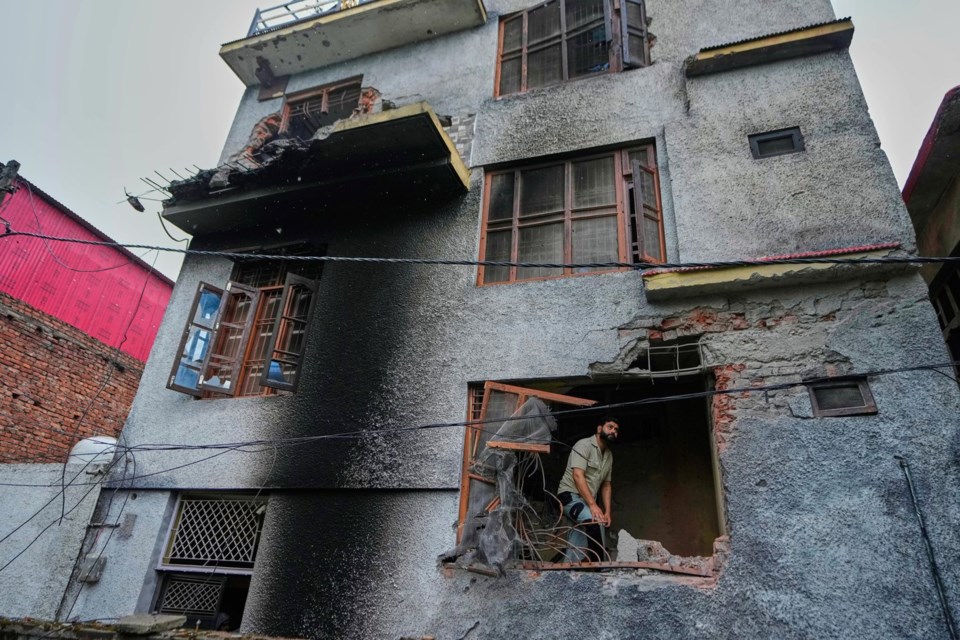VANCOUVER — A British Columbia researcher in South Asian affairs said Thursday that concerns about the current India and Pakistan tensions are justified, given that the region has not seen conflicts this intense in more than 25 years.
M.V. Ramana, professor at University of СŔ¶ĘÓƵ's school of public policy and global affairs, said the last time there was a realistic risk of nuclear weapons being used was the conflict between the two sides in the Kargil region of Kashmir in 1999.
Ramana said the difference between then and now is that in 1999 the United States brokered an end to hostilities, but the current White House administration has not shown similar diplomatic priorities.
“The last time there was such a serious war over Kargil, the conflict was ultimately resolved when the then-prime minister of Pakistan Nawaz Sharif came to Washington and met with president Bill Clinton,” Ramana said. “Clinton evidently showed him the proof that the U.S. intelligence had gathered about Pakistani activities, and Nawaz Sharif had to go back and stop the military from doing whatever it was doing."
He said that kind of diplomatic pressure isn't being placed on either India or Pakistan right now.
India launched missile strikes into Pakistani-administered areas earlier this week that killed 31 people in what it said was retaliation for an April attack on Indian Hindu tourists in Indian-administered Kashmir.
Pakistan denied involvement in the April attack, but both sides have escalated the conflict since, trading heavy fire across their frontier in disputed Kashmir where Pakistan claimed it killed scores of Indian soldiers.
The Pakistani government also accused India of drone attacks that killed at least two civilians, while India said it has “neutralized” Pakistan's attempts to hit military targets.
Not all of the claims by either side have been verified.
“Canada is monitoring the situation between India and Pakistan,” wrote Global Affairs Canada spokeswoman Renelle Arsenault. Her statement noted the updated travel advisories, but had no comment on the situation in the region.
The advisory issued Wednesday warned Canadians in the region to be vigilant and "prepare to shelter in place."
"Tensions could increase and the situation could deteriorate rapidly," the Global Affairs advisory said.
Ramana said that while the rancour between India and Pakistan is long-standing, the current level of aggression has already surpassed that of the conflict in 2019 with more cross-border friction rather than just conflicts along the border between the countries.
He said that the United States hasn’t been alone in its inaction on the issue, with countries such as the United Kingdom signing a trade agreement with India recently.
“That seems to suggest that many of these countries, the Western countries that have traditionally played a part in diplomacy, seem to see India more as a trading partner and wanting to enhance that, rather than get enmeshed in any of these disputes,” Ramana said.
He said the growth of social media has also added to his level of concern about the situation, as it makes it harder for governments to take less forceful responses given the nationalistic emotions behind the conflict.
Ramana also said that India’s economic performance under Prime Minister Narendra Modi may also play a role in the aggression being ratcheted up.
“Modi himself has come to power originally, promising all kinds of economic growth and jobs and so on and so forth, which arguably he has not delivered on” he said. “And so every time that there is one of these kinds of conflicts, that actually enhances his political stature within the country.”
The concern now, Ramana said, is whether the conflict will reach the threshold where Pakistan would consider using nuclear weapons — a prospect no one wants to see.
“It's possible that one of these red lines is crossed in the course of this military exchange,” Ramana said. “And that's, I think, something we should be all very concerned about.”
— With files from Dylan Robertson and The Associated Press
This report by The Canadian Press was first published May 8, 2025.
Chuck Chiang, The Canadian Press



